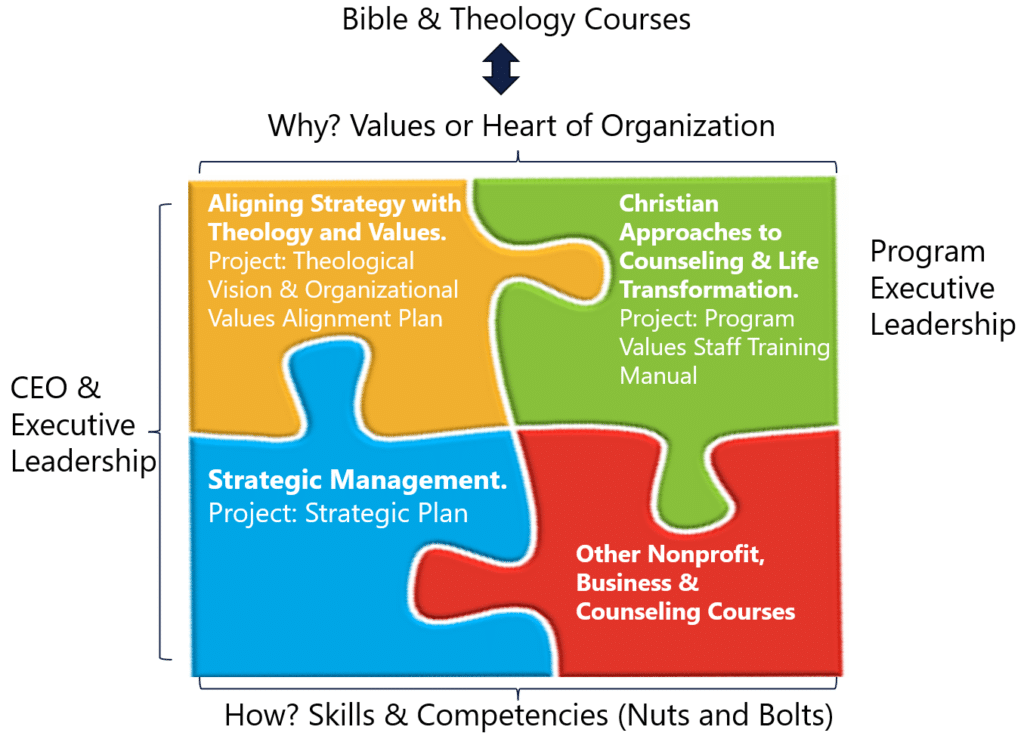Course Syllabus
MIN701: Aligning Strategy with Theology and Values
Instructor & Contact Information
The People tab in Canvas provides information on the course instructor and you can send a message to your instructor following these instructions. Faculty are expected to: 1) grade and return assignments, with feedback, within 7 days from the date of submission; 2) reply to your Canvas messages within 72 hours; 3) reply several times each week in total in the discussion forums (not to each individual student); and 4) demonstrate the core values of City Vision University.
Course Description
As society and the needs ministries face are rapidly changing, often we need to update our strategies based on the new context. To adapt without secularizing, it is critical that ministries conduct deep reflection on their values and theology to develop a theological vision to guide this process. This course will help students create a theological vision for their organization consisting of an inspirational understanding of its mission, vision and values that fits with their context. This will then be used as a guide to ensure that the organization’s strategy is aligned with its theology and values.
Is a project based course with the final project to develop a Plan to Operationalize Values and Avoid Mission Drift based on the Operationalizing Values & Avoiding Mission Drift Ministry Best Practices Checklist.
You can see how this course relates to other courses in the slide below.

Organizational Requirements
This course requires that a student identify an urban ministry, urban mission or other Christian ministry serving those who are poor, recovering from addiction or an otherwise disadvantaged population. The student will need to be able to interview and collect documents from the organization to understand how their vision and values direct how they do ministry. Because of the theological nature of this course, students must work with a Christian organization. Because a major focus of this course is to resist secularization tendencies, for some of the assignments, it may be helpful if the ministry comes from a theologically conservative framework (because they typically are more concerned about avoiding secularization).
Course Outcomes
After completing this course, you will be able to:
-
- Identify common ways in which Christian organizations drift from their original missions and secularize.
- Assess an organization’s current theological and values alignment using the Wesleyan quadrilateral of Scripture, tradition, reason, and experience.
- Develop an applied theological vision for an organization that includes a Scripturally aligned and culturally contextualized understanding of its mission, vision and values.
- Justify the choices made in the organization’s strategic plan, organizational culture and structure based on the theological vision and values.
Degree Program Outcomes
This course supports the following program outcomes, marked with an (I) for Introduce, (D) for Develop and an (M) for Mastery.
- Research methods. Apply action research methods to practical research topics in the field.
- Diffusion of Innovation. Utilize technology and relational networking to help diffuse innovations within a community of practice.
- Values Alignment. To develop a theological vision and to align your organization's strategy, culture and systems with that vision to avoid secularization and mission drift. (M)
- Strategy. To develop a synthesis to integrate a wide range of business skills into a strategic plan for starting or growing an organization.
- Social Entrepreneurship. Develop strategies and plans to effectively use technology and innovation to achieve organizational goals.
- Action Research Project. Synthesize action research with theory and practice to solve a practical challenge facing your organization and/or the larger field.
Broad Institutional Outcomes
- I1. Knowledge (Head). Apply a wide range of tools to help solve society’s great problems by shifting from a single lens/tool/discipline to a multiple lens, multifaceted Biblical understanding of reality. (D)
- I2. Skills (Hands). Develop the skills you need for the next position in your development as a leader by shifting from mastery & understanding of a division in an organization to a comprehensive systemic mastery/understanding needed to lead across the organization.
- I3. Attitudes/Character (Heart). Develop the character and discipline needed to step into greater leadership roles by losing the bias of your old position to gain a broader perspective and intellectual humility needed to accelerate your commitment to lifelong learning. (D)
Required Texts
Students are required to purchase these texts before the first day of classes.
-
Greer, P., Horst, C., Haggard, A., & Crouch, A. (2015). Mission Drift: The Unspoken Crisis Facing Leaders, Charities, and Churches (Reprint edition). Bethany House Publishers.
Students will select one additional book related to practical theology in their context. A list of suggested books will be added below.
Guidelines for Written Work
All written work must follow our Writing Format and Forum Requirements. You must read these to understand how to cite sources appropriately.
Critical Policies to Read for This Course
Note: These policies are critical for all students to read. In case of change, we have linked to the versions on our website to make sure you have the latest version.
Additional Policies:
This syllabus is subject to change without notice up until the first day of the semester. Last updated: November 24, 2025.
Course Summary:
| Date | Details | Due |
|---|---|---|